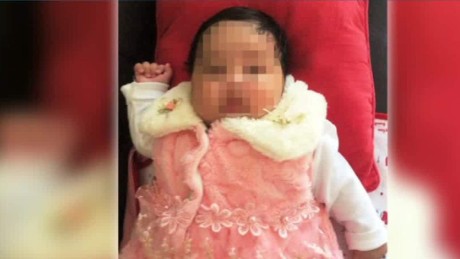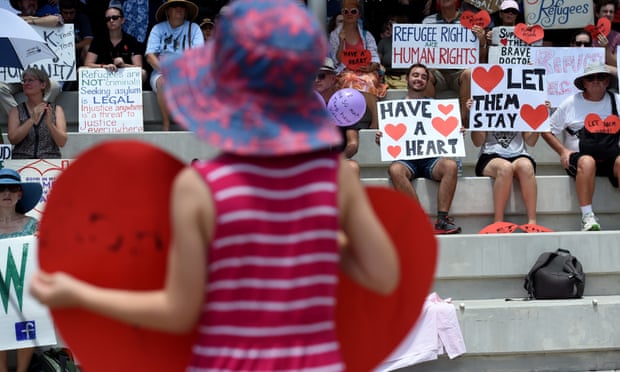' Moving Baby Asha, both sides claim victory but there really is no (realistic) siatifactory solution here'

Photo: dailyreadlist
Baby Asha
Taking Asha out of hospital and into detention in Australia spares the infant an immediate return to Nauru but leaves her – and government policy – in limbo. Indeed, the release of Baby Asha into community detention in Australia was the most pragmatic solution available to end the deadlock at Lady Cilento hospital.
It has brokered a situation where both sides can claim a measure of victory: those supporting the family are assured she is not being moved to Nauru; the government can claim its policies are unaltered.
But the solution is none at all. It is a temporary fix, masking a deeper, systemic fracture yet to be addressed.
Asha may stay in Australia many months, possibly years, but is her family to exist permanently in the shadowlands of community detention, without any hope of finding a place, or a way, to build a life?
Meanwhile the government maintains the infant and her family will, at some stage, be returned to Nauru, because policy mandates it.
Now that Asha is removed from hospital, her transfer will only require the approval from International Health and Medical Services – which runs healthcare for asylum seekers for the Australian government – that she is fit to fly, according to senior sources in the department.

People are moved across the country by the immigration detention regime all the time, often against their will. People are sometimes woken in the middle of the night, restrained if their guards feel they should be, and put on chartered planes if they won’t submit to a commercial flight.
Asha’s removal to Nauru would be undoubtedly controversial but would dominate media attention only for a short time, and the government may see this controversy as outweighed by the benefits – both domestically politically and in its regional messaging – that Australia’s resolution to stop boat arrivals is undimmed.
The immigration minister, Peter Dutton, is walking a difficult line on this issue, offering, simultaneously, almost contradictory messages to different audiences.

Photo: AAP Image/Jamie McKinnel
Asylum-seeker advocates gather outside Brisbane's Lady Cilento Children's Hospital in support of one-year-old baby Asha, in Brisbane, Sunday, Feb.
On the one hand, he is seeking to argue that the government will act compassionately and adhere to the clinical recommendations of doctors, who argue, almost universally, that children should not be in detention.
At the same time, to maintain a politically successful policy position, and to defend that policy’s deterrent effect on smuggling networks overseas, the minister must insist that nothing has changed in regards to offshore processing.
Immigration detention is heavily politicised in this country, and broadly misunderstood. Dutton has said several times he wishes to be the minister who frees all children from detention.
This is a laudable aim, and one within his bailiwick. Immediately. Today. With the stroke of a pen. But it has also been within the ambit of every immigration minister before him since detention was introduced by Gerry Hand in Paul Keating’s Labor government.
Detention is not a natural state of being for children, or for anybody. People are not arriving in Australia and putting themselves in detention. Nor do they have to go there.
People are in detention because governments have chosen to put them there.
People are in detention because of a policy of mandatory detention, a policy that has, in the 24 years it has existed, been transmogrified from a form of administrative detention (mandatory detention originally had a legislative time limit of 273 days) to one of active deterrence, where harmful, aversive incarceration is visited upon a group of people alleged to have committed no crime, in order to prevent others from similarly not committing any crime.
No part of this structural issue has been addressed in the week-long debate over Asha, nor in the resolution to the deadlock over her.
Asha’s release into community detention has been celebrated by her supporters and the doctors who treated her. At the same time the government is pointing to an unadulterated policy position. But nothing has really been resolved.
Some involved in the asylum debate in Australia have argued that the if outspoken doctors, refugee advocates and certain media outlets were quieter in their public protestations about the situations of Baby Asha and others like her – such as the 267 enjoined to the M68 case – then the government would more able to act compassionately, quietly resolving their cases outside of the glare of public attention.
The argument has come not only from the secretary of the immigration department, but from media commentators as well – defenders of a free press and open government, usually.
It is a dangerous proposition.
For a government to incarcerate people in secret, letting them out only when it chooses, and all the while expecting the media and civil society to supinely ask no questions, is anathema to a free society.
Democratic governments don’t have the option of saying, “Trust us, we’re the government.”
Throughout history, as the British writer CP Snow argued, “far more, and far more hideous, crimes have been committed in the name of obedience than have ever been committed in the name of rebellion”.
Protest, the right to oppose government practice, to question its policy, is a democratic right, indeed a necessity. And it makes a difference.
If everybody had shut up about Baby Asha – if the doctors hadn’t demanded their clinical recommendations be observed, if protesters hadn’t stood their ground – she would be on Nauru now.
Courtesy: Guardian

No comments:
Post a Comment